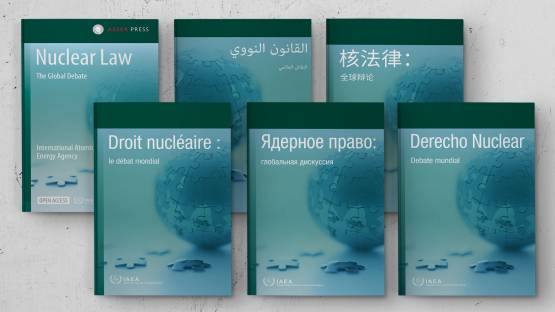The IAEA’s first ever book by global thought leaders on nuclear law, Nuclear Law: The Global Debate, is now available in five languages – Arabic, Chinese, French, Russian and Spanish – in addition to its original English version, which was published in April this year.
In a ceremony today in Vienna, which took place on the sidelines of the IAEA’s Symposium on International Safeguards, IAEA Director General Rafael Mariano Grossi provided signed copies of the book to attendees. Mr Grossi authors the opening chapter of the book.
Highlighting the value of the book, particularly in the five languages, Mr Grossi said: “Nuclear law is an essential prerequisite for the safe, secure and peaceful uses of nuclear technology and its applications.”
“This book includes the thoughts and ideas of some of the most distinguished people in their field, many of them lawyers,” he added. “It makes the global debate in nuclear law accessible to a wider audience and helps ensuring that informed decisions are made by States considering the views and contributions of the stakeholders in the global community, including international organisations, non-governmental organisations, industry, academia and civil society.”
The nuclear law book contains a compilation of essays on the field of nuclear law, including articles by leading scholars, policymakers, lawyers and scientists. The authors outline the four pillars underpinning nuclear law, namely safety, security, safeguards and civil liability for nuclear damage. They discuss key aspects of nuclear law including, for example, the successes and challenges of establishing regulatory bodies, national nuclear security regimes and national nuclear power programmes. The book also covers emerging technologies, such as small modular reactors, with chapters highlighting the legal issues surrounding the deployment of floating power plants and analysing the applicability of the international physical protection obligations to advanced reactor technologies.
Tracing the journey of nuclear law – its origins, how it has developed, where it is now and where it is headed – the book aims to provoke in readers thought and discussion about how the role of nuclear law can help enable the peaceful uses of nuclear science and technology, including in economic development, climate change mitigation, and the achievement of the United Nations Sustainable Development Goals.
The IAEA plays a multi-faceted role in the development and implementation of nuclear law. The Agency is the depositary of the international legal instruments on safety, security, safeguards and civil liability for nuclear damage.
This year the Agency commemorates the 50th anniversary of the entry into force of the first Comprehensive Safeguards Agreement (CSA) in connection with the Treaty on the Non-Proliferation of Nuclear Weapons (NPT). CSAs are agreements signed with non-nuclear-weapon States parties to the NPT, which give the IAEA the right and obligation to ensure that safeguards are applied on all nuclear material in all peaceful nuclear activities, to verify that the material is not diverted from peaceful use to nuclear weapons.
This year is also the 25th anniversary of the entry into force of the first Additional Protocol (AP) with a CSA State. The AP to a safeguards agreement provides to the IAEA additional tools for verification. It significantly increases the IAEA’s ability to verify the peaceful use of all nuclear material in states with Comprehensive Safeguards Agreements.
The book, Nuclear Law: The Global Debate, is available in hardcover and freely downloadable in e-book format.




